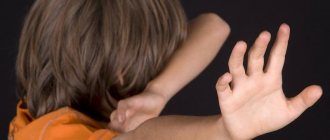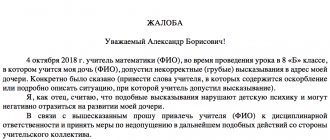Photos: Depositphotos / Illustration: Yulia Zamzhitskaya
In recent years, bullying has been talked about as one of the most difficult problems in school education. But it happens that a student is pestered not by his desk neighbor, but by the one who, in theory, should set a positive example and be the owner of high moral qualities - the teacher.
Rough and unethical behavior of a teacher always causes a barrage of criticism. If a violation of professional ethics becomes known to the general public, then the prosecutor’s office begins to take an interest in the teacher’s actions - as, for example, in the case of a teacher from Stary Oskol, who in a video published on the Internet calls her student “you piece of freak”, “you piece of moron”, and also wishes so that it peels off 20 times.
While working on this material, we asked 100 school graduates from different regions of Russia the question: “Have you encountered bullying from a teacher?” 58 percent of respondents responded that they or someone they knew had suffered from bullying, rudeness, or tactless behavior from their teachers.
Where does teacher rudeness come from?
Some teachers allow themselves to bully, “tease” a student, treat him rudely or harshly, knowing that he will not come into conflict with the teacher and will not respond to bullying.
The reasons why a teacher takes it out on a child can be different.
Pedagogical incompetence and short-sightedness.
There are teachers who practice an imperative style of communication with the class: they demand strict obedience and use psychological pressure. They are rude to children because they sincerely believe that this is the only way to achieve discipline.
Professional burnout.
A teacher who has lost interest in the profession becomes cynical, allows himself to raise his voice and communicate with any of the students with disdain.
Revenge in response to lack of respect from a student.
If a child does not treat the teacher or his subject with due respect, he lowers grades, insults or puts the student in an unfavorable light.
Personal animosity.
It also happens that a teacher treats a student poorly for no apparent reason and the situation cannot be affected by any actions of the victim. The traumatic behavior of a teacher causes irreparable damage to the psyche of a student of any age.
“Who calls you what names…”
According to a survey conducted by the Pedagogical Council for this material, 53 out of 100 graduates of Russian schools experienced the rich vocabulary of teachers.
Victoria , Chelyabinsk:
“In my harsh school, the teachers knew no boundaries at all. The physical education teacher called the girls “fat,” the math teacher called them “stupid.” Perhaps they wanted to shame us with this, to force us to come to our senses. In fact, we just hated classes and almost stopped going to school. What for? We’re all worthless guys anyway.”
Conventionally, pedagogical curses can be divided into three types .
- Transition to personality.
Examples : “You are a fool/moron/idiot/nonentity.”
Evgeniy , St. Petersburg:
“My chemistry teacher could easily tell a student who got a bad grade that he was a moron. During the lesson, sorting out the class’s mistakes, she asked loudly: “Ivanov, are you an idiot?” Just honestly, do you even know anything?” We were still giggling about it then, but now I understand that a teacher shouldn’t behave like that.”
- Address to class.
Example : “Talentless ignoramuses/herd.”
Olga , Ekaterinburg:
“In the 11th grade, every lesson the math teacher inspired us to believe that we would not pass the Unified State Exam and would not achieve anything in life. She said: “None of you know a damn thing! You are so stupid that you can’t pass anything even with cheat sheets! You are my worst issue!”
- Abstract abuse.
Examples : any obscene language depending on the situation.
Andrey , Chelyabinsk:
“Our labor teacher was very expressive. We were sixth graders when he once hit the table leg and shouted to the whole office: “Oh, you motherfucker!” No one in my family swore, so to say I was shocked is an understatement.”
When a teacher crosses boundaries
“In 11th grade, I spent a lot of time studying and preparing for the Olympiads in order to enter a university on a budget. Due to the heavy workload, I had nervous breakdowns, so I gained a lot of weight. On Saturdays, we had a physical education lesson at eight in the morning, and sometimes I skipped these classes in order to get some sleep.
One time I came to the gym, and my teacher took me to the center and began to scold me in front of the whole group for skipping classes, with the phrase: “You can skip math, but definitely not physical education.” Have you looked at yourself in the mirror lately?”
Now I’m already in my third year of university, I’ve lost a lot of weight, and I have a boyfriend, but still every time I eat too much, I remember that phrase and run to the scale. I’m constantly afraid of gaining weight, because then they might say to me again: “Have you looked in the mirror lately?” This haunts me even after four years and more than 40 hours of communication with a psychologist,” says Anna, a graduate of the Yekaterinburg gymnasium.
Because of the teacher's criticism, the child runs the risk of becoming unsure of himself or doubting the correctness of his choice.
“I have been swimming since the first grade and always dreamed of becoming an athlete, so in the 11th grade, when choosing a university, I had no doubt that I would go into physical education. When applying, it is more important to provide good results in swimming, rather than excellent Unified State Exam scores, so I devoted more time to training.
One day, the class teacher decided to have a conversation with me in a raised tone about the fact that I still wouldn’t make a great athlete and I wouldn’t be successful in swimming. She asked me to study and discard “stupid” thoughts about swimming. I hated school because she said this to me every time we saw her, so I turned to a psychologist.
Now I’m going to the Russian Championship and I’m very glad that then her words didn’t break me and didn’t force me to give up my dream. But many of my friends, to whom teachers told the same thing, alas, listened to the “good” advice and went to study in other specialties,” says Dmitry, a graduate of the Chelyabinsk school.
Some teachers try to deal a painful blow to children's self-esteem.
“I dreamed of becoming an architect, so in the 11th grade I definitely decided that I would take specialized mathematics at the Unified State Exam. However, my teacher laughed out loud after I told her about this and said that I was unlikely to be able to pass even the basic level.
At first, I decided not to pay attention to her ridicule, but she took the tests in specialized mathematics from me and gave me the basic version on “samples”, did not tell me about the postponement of elective classes, and right on the day of the exam she wished me at least a minimum score. I burst into tears right at the entrance to the school - my hands were literally shaking from fear of not passing.
In the end, I managed to score 88 points (the average passing score is 50), but I still consider myself weak in this subject. At the university, during mathematics classes, I try to sit in the back desks so as not to go to the blackboard,” says Violetta, a graduate of the St. Petersburg school.
Who might be the victim?
Psychologist Galina Shvets says that any child can fall out of favor with a teacher.
It happens that a student regularly attends all lessons, completes homework and writes tests well, but the teacher still treats him with disdain. The reason for hostility and insults on his part may be some external features or character traits of the student - excess weight, too tall/short stature, hyperactivity/slowness, clothing and even birthmarks.
“My first teacher hated me. She took it out on me and treated me very disrespectfully and contemptuously. But at that moment I did not understand that the reason was not in me, and I thought that I deserved such an attitude.
Now I understand that I just irritated her and she took out her anger in this way. As a child, I walked around with plates, and food residues constantly accumulated in my mouth after eating. She called me to the board with the phrase: “Kazantseva, show me what’s in your mouth.” And I stood in front of the whole class with my mouth open and felt like I was in a circus. It’s good that my mother quickly responded to this and transferred me to another class,” says psychologist Veronika Kazantseva.
Often children do not understand why the teacher is opposed to them, so they begin to look for reasons within themselves. This is how complexes are born, the desire to go to classes with this teacher and generally study the subject disappears.
“Most often, teachers who bully children have themselves been bullied, humiliated, or violated by adults. This is the pain that they act out on their students,” explains Ekaterina Materina, an educational psychologist with 17 years of experience. Therefore, the cause of “teacher bullying” may be the same factors due to which the teacher himself was once attacked.
Which students don't like?
A teacher may develop hostility toward a child who does not meet the student’s ideal. It is different for each teacher: some consider personal qualities to be the most significant, some like discipline most, and for others knowledge is the main thing. How many teachers - so many opinions.
But there are also such guys (very, very rarely) for whom, willy-nilly, hostility awakens in the soul of any teacher:
- A “wrong” authority who can take the whole class to the cinema instead of an assignment, or disrupt a test just because he doesn’t want to share the teacher’s attention. Such a child knows how to manipulate people and strives to achieve his goal by hook or by crook. He does not respect his elders, he can insult, and he always “hits” where it’s most unhealthy (another talent of his is to find weak points).
- An arrogant child, accustomed to thinking that the Earth revolves around him. He despises those around him and threatens his parents if something doesn’t go the way he wants. Although in reality he imagines absolutely nothing.
- A “complainer” who constantly complains to parents about the teacher (often without reason). He doesn’t like difficult assignments (they give him headaches), bad grades (the teacher doesn’t like them), his parents stand up for him, he always has someone else to blame, not himself (even if he received a “2” for an uncompleted assignment).
- Parvenu, arguing with the teacher on any issue, even if in the end he turns out to be wrong. It’s good if he tries to justify his point of view, but what if he insists on his own, despite the obviousness of the facts presented? Teachers value perseverance, not stubbornness.
- A sneak or an informer. On the one hand, it’s not bad, because you can find out about everything that happened. On the other hand, it is unpleasant that a person capable of betrayal is growing up.
There is also dislike towards those who interfere with the lesson. All teachers love their object, and they want the children to love it too. And the best indicator of this is good motivation, “burning” eyes, the desire to work without being distracted by anything.
What to do with a “difficult” teacher
If a student faces bullying from a teacher, he usually decides to “take revenge” on him - not to attend classes, to “forget” the subject. However, such tactics will not improve the situation, but will only have a detrimental effect on academic performance.
Galina Shvets is sure that it is impossible to cope with bullying that comes from a teacher alone. The child can try to change his behavior and attitude towards the subject, but if he does not guess what the real reason for the bullying is, then this method will be useless.
You should not try to confront the teacher using aggressive methods: calling him names in response to harsh or tactless remarks, shouting, making scandals, or refusing to attend lessons. This behavior will only make the problem worse.
If “bullying” by a teacher happens systematically, Galina Shvets advises schoolchildren to tell adults about it - first of all, their parents or school psychologist: they will be able to objectively assess the situation and make the right decision.
Statement of insult
An application for insulting a student by a teacher is submitted to the police, the prosecutor's office and the school director. You can draw up the document correctly using a given template or using the help of our lawyers. What should be included in a statement of insult:
- where/to whom the document is submitted - school number, full name of the director, name of the court, police department, details of the head of the institution/prosecutor, etc.;
- information about the applicant and the victim;
- the essence of the problem – events, facts, information about the insult, etc.;
- evidence confirming the teacher’s guilt - audio/video recording, testimony of classmates and other participants in the conflict, printouts of SMS messages or pages from social networks;
- references to the law on protecting the interests of the student and requirements for holding the teacher accountable;
- signature and date.
If there was an attempt to resolve the conflict peacefully, then a copy of the complaint to the school director and information about the oral conversation should be attached to the application. If there is testimony, all papers must be certified by signatures.
Note!
Children may only be interviewed in the presence of parents, guardians and a school psychologist.
If the application is submitted to the prosecutor's office, then, based on the evidence provided, a decision is made to initiate an administrative case, the investigation period of which does not exceed 1 month. The fate of the teacher is decided by the court at the plaintiff’s place of residence.
In case of physical violence, it is recommended not to delay contacting law enforcement agencies, but to involve an experienced lawyer in the case and remove the beatings, if any, or prepare indisputable evidence of a push, blow, slap or other action of the teacher.
What is the responsibility for insulting a student?
What will happen to a teacher for insulting a student is established by Art. 5.61 Code of Administrative Offenses of the Russian Federation. According to this administrative norm, the following penalties are provided for insulting a person:
- for humiliating the honor and dignity of a person, a fine of up to 3 thousand rubles is imposed on citizens, on officials (teacher) - up to 30 thousand rubles, and on legal entities - up to 100 thousand rubles;
- insult in the media (radio channel, TV show, newspaper, Internet portal, etc.) – the fine for citizens increases to 5 thousand rubles. maximum, for officials - up to 50 thousand rubles, and for legal entities - up to 150 thousand rubles.
In addition to administrative liability, the student's parent has the right to demand compensation for moral damage. The amount of compensation depends on the degree of guilt of the offender and the consequences of the incident.
If information discrediting the child’s honor was disseminated en masse, the teacher will be held accountable under Article 128.1 of the Criminal Code of the Russian Federation - libel.
In the case of physical abuse of a child, law enforcement agencies are involved in the investigation and a simple fine will not get rid of it. These crimes include imprisonment, removal from positions and forced labor. In any situation, it is better to seek support from an experienced lawyer who will help collect evidence, avoid slander from the offender and achieve justice according to the law.











